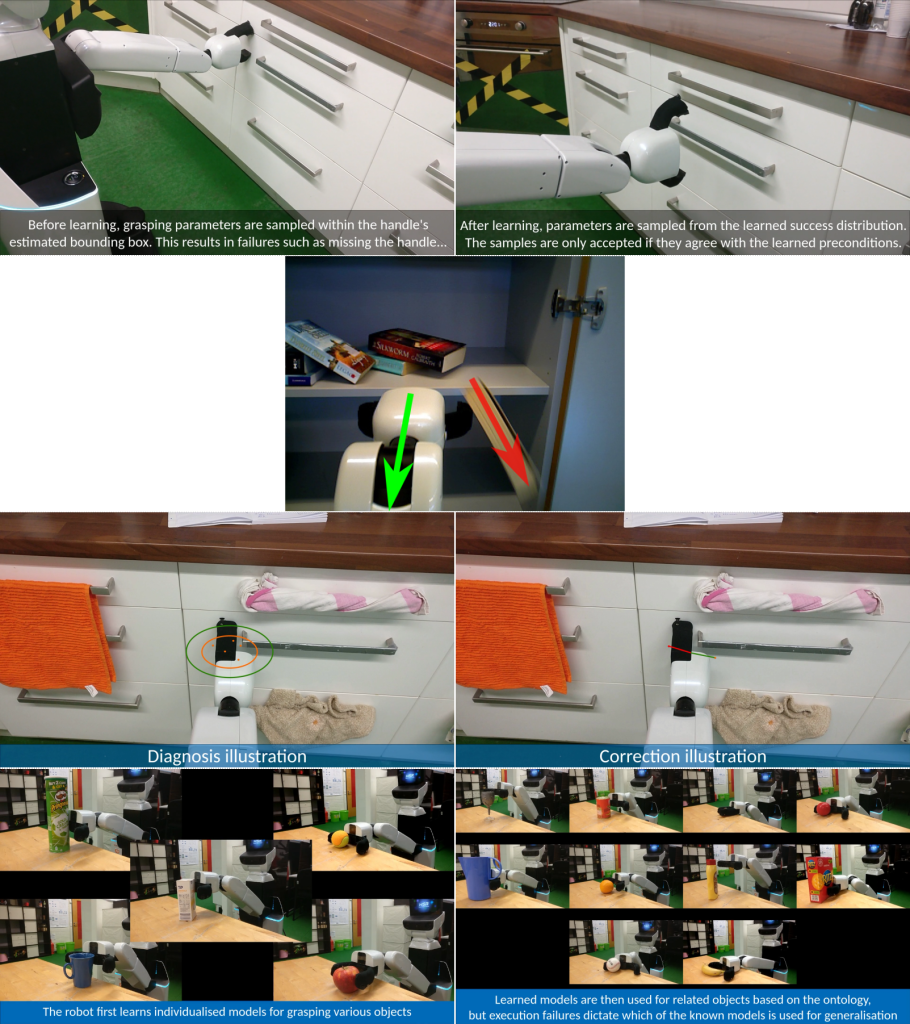Hochschule Bonn-Rhein-Sieg, Autonomous Systems Group / Institute for Artificial Intelligence and Autonomous Systems (A2S).
Last updated: Feb. 27, 2023
We focus on increasing the failure awareness of robots
Member
- Paul G. Plöger, Professor and Head of Group, Hochschule Bonn-Rhein-Sieg
- Alex Mitrevski, Research Associate, Hochschule Bonn-Rhein-Sieg
- Santosh Thoduka, Research Associate, Hochschule Bonn-Rhein-Sieg
Link
- A2S Institute: https://www.h-brs.de/en/inf/institute-artificial-intelligence-autonomous-systems-a2s
- YouTube channel: https://www.youtube.com/@a2s-institute
- Main software repository: https://github.com/b-it-bots/mas_domestic_robotics
Abstract
Robots operating in everyday, human-centred applications need to interact with their environment, including objects, humans, and potentially other agents. Everyday environments are generally not fully structured, however; as a consequence of this, robots are prone to experiencing a variety of execution failures throughout their operation. The strategies that are used to address and communicate execution failures can have an effect on the reliability, trustworthiness, and overall usefulness of a robotic assistant. Our research using the HSR focuses on the functionalities required for making domestic robot assistants reliable in their operation without sacrificing the transparency during the decision-making and execution process. We particularly conduct research and development activities that combine (i) knowledge representation, (ii) contextual adaptation for robot-centric execution as well as human-robot collaborative scenarios, (iii) execution monitoring for reliable action and task execution, and (iv) failure diagnosis for guiding the robot execution and learning process. We address this through work on learning-based robot skills and monitoring representations, such that we particularly focus on hybrid learning methods that enable the combination of prior knowledge with a robot’s own experiences acquired during execution. Through this, the overall objective of our research is to increase the reliability and explainability of robots, thereby making them more suitable for use in human-oriented applications.

Reference
- A. Mitrevski, P. G. Plöger, and G. Lakemeyer, “Ontology-Assisted Generalisation of Robot Action Execution Knowledge,” in Proceedings of the IEEE/RSJ International Conference on Intelligent Robots and Systems (IROS), 2021, pp. 6763-6770.
- S. Thoduka, J. Gall, and P. G. Plöger, “Using Visual Anomaly Detection for Task Execution Monitoring,” in Proceedings of the IEEE/RSJ International Conference on Intelligent Robots and Systems (IROS), 2021, pp. 4604-4610.
- S. Thoduka and N. Hochgeschwender, “Benchmarking Robots by Inducing Failures in Competition Scenarios,” in Digital Human Modeling and Applications in Health, Safety, Ergonomics and Risk Management. AI, Product and Service (HCII), 2021.
- S. O. Sohail, A. Mitrevski, N. Hochgeschwender, and P. G. Plöger, “Property-Based Testing in Simulation for Verifying Robot Action Execution in Tabletop Manipulation,” in Proceedings of the European Conference on Mobile Robots (ECMR), 2021, pp. 1-7.
- A. Mitrevski, P. G. Plöger, and G. Lakemeyer, “Robot Action Diagnosis and Experience Correction by Falsifying Parameterised Execution Models,” in Proceedings of the IEEE International Conference on Robotics and Automation (ICRA), 2021, pp. 11025-11031.
- A. Mitrevski, P. G. Plöger, and G. Lakemeyer, “Representation and Experience-Based Learning of Explainable Models for Robot Action Execution,” in Proceedings of the IEEE/RSJ International Conference on Intelligent Robots and Systems (IROS), 2020, pp. 5641-5647.
- A. F. Abdelrahman, A. Mitrevski, and P. G. Plöger, “Context-Aware Task Execution Using Apprenticeship Learning,” in Proceedings of the IEEE International Conference on Robotics and Automation (ICRA), pp. 1329-1335, 2020.
- A. Mitrevski, A. Padalkar, M. Nguyen, and P. G. Plöger, “”Lucy, Take the Noodle Box!”: Domestic Object Manipulation Using Movement Primitives and Whole Body Motion,” in Proceedings of the 23rd RoboCup International Symposium, Sydney, Australia, 2019.
- A. Mitrevski and P. G. Plöger, “Reusable Specification of State Machines for Rapid Robot Functionality Prototyping,” in Proceedings of the 23rd RoboCup International Symposium, Sidney, Australia, 2019.